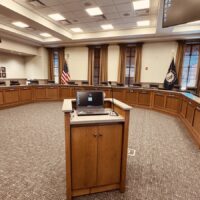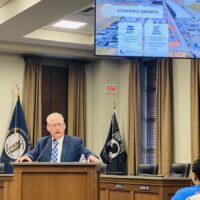Confusion and miscommunication about where to vote in Christian County during the May primary election prompted a special county election board meeting Friday morning at the Christian County Courthouse.
The county switched from 31 polling places to seven in November 2020 because of COVID-19 precautions. But when local officials continued with the smaller number of polling places for this year’s May primary, many voters apparently weren’t aware their voting location had changed.
Nearly 20 public officials and residents discussed possible solutions, but no official action was taken during the hourlong session — in part because the board violated a section of the Kentucky Open Meetings Law that deals with giving the public advance notice of meetings.
Open meetings issues
At the start of the meeting, Hoptown Chronicle editor Jennifer P. Brown told the election board that state law requires a public agency to provide an agenda with notice of a special meeting, and that the meeting must be limited to items on the agenda. In addition, she said, a meeting notice must be posted in a conspicuous place where the meeting will occur. None of those requirements were met.
Christian County Clerk Mike Kem said his office puts all its meeting notices on its Facebook page, including regular meetings at 10 a.m. on the third Thursday of each month. The notice for Friday’s special meeting went up three days in advance. It did not include an agenda.
With an audience of roughly 35 people present — much larger than is typical for a county election board meeting — Kem and his three fellow board members, Chief Deputy Sheriff Jason Newby, Republican representative Philip Eastman and Democratic representative Jim Gardner, went ahead with the meeting.
County Judge-Executive Steve Tribble asked if people in the audience would be allowed to speak, and then suggested that the courtroom’s live Facebook feed ought to be activated. Kem agreed to both.
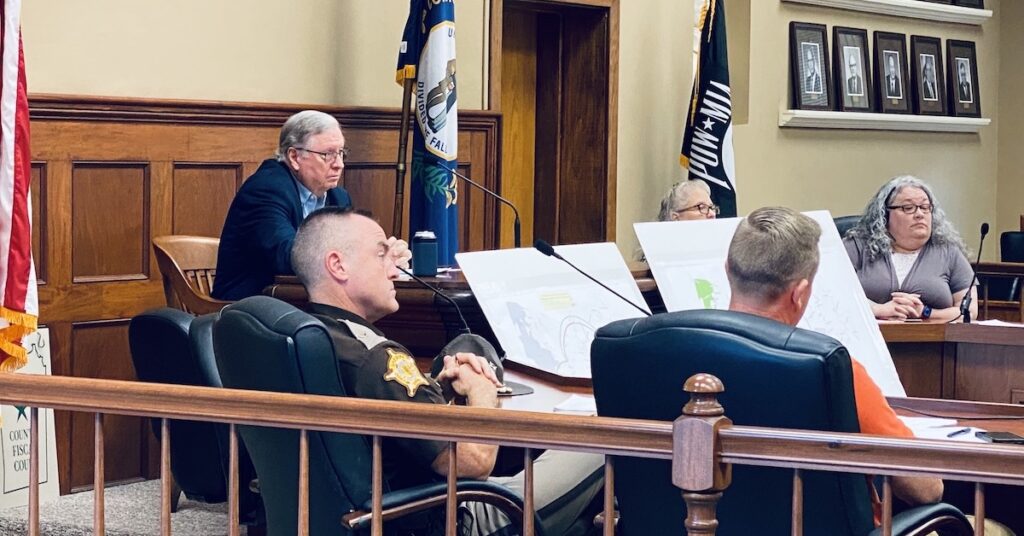
As speakers stepped to the microphone, several grievances were aired, and suggestions were made for improving access to voting and communications between the clerk’s office and voters.
More than once, when speakers said Kem was at fault for various problems, he said, “The buck stops here,” to indicate he took responsibility.
Voting precincts vs. voting centers
Board member Gardner said he wanted to go back to traditional voting precincts. Under that system, there were 31 polling places in Christian County, one for each precinct, and every voter was required to cast their ballot at their assigned precinct.
“There’s a lot of hurdles, but that’s what I’m hearing that the voters want,” he said.
Kem countered that voting centers allow voters to cast their ballot at any polling place in the county, regardless of their residency. In May there were eight voting centers. The board is now considering increasing that number to at least 13.
“That’s the future,” Kem said, while acknowledging that people are resistant to change.
Christian County first used voting centers during the November 2020 general election because the pandemic required changes, including using fewer poll workers and having larger polling places — such as the James E. Bruce Convention Center — to reduce the risk of coronavirus exposure.
“We do want to be part of the future,” said Hopkinsville resident Rachel McCubbin, who previously was a poll worker and helped the clerk’s office recruit other poll workers.
McCubbin praised the efficiency of the voting centers and said she was surprised by how quickly she was able to vote.
Fiscal responsibility is also a factor, she said. The county does not have to pay as many poll workers when it uses voting centers rather than voting precincts.
Polling sites
A meeting handout listed 13 proposed voting centers for this year’s general election. Five would be located in Hopkinsville — Christian County Courthouse, Senior Citizens Center, Bruce Center, Boys and Girls Club and Indian Hills Elementary. In the county, each of the following communities would have one voting center — Crofton, Sinking Fork, Pembroke, South Christian, Oak Grove, Concord, New Barren and New Palestine.
Tribble said the county magistrates favored going back to voting precincts, but if that doesn’t happen they want to see more than 13 voting centers.
Nikki Chambers, a member of the local League of Women Voters, had three recommendations. Add a voting center to Hopkinsville’s Eastside neighborhood, send postcards with polling locations to every voter before the general election and switch Oak Grove’s voting center from Valor Hall to the city’s community center, she said.
“No matter what is decided, the decision needs to be made quickly in order to get the information out quickly to the voters of Christian County,” said Chambers.
Tribble gave three suggestions for an Eastside location — First Street Baptist Church, Booker T. Washington School or Cedar Grove Baptist Church.
Melissa Lynch, director of the Oak Grove Community Center, said that the facility is a better choice than Valor Hall for a voting center because it is more centrally located — but she also questioned why the city has only one voting center. Oak Grove is the county’s second largest town with more than 7,000 residents.
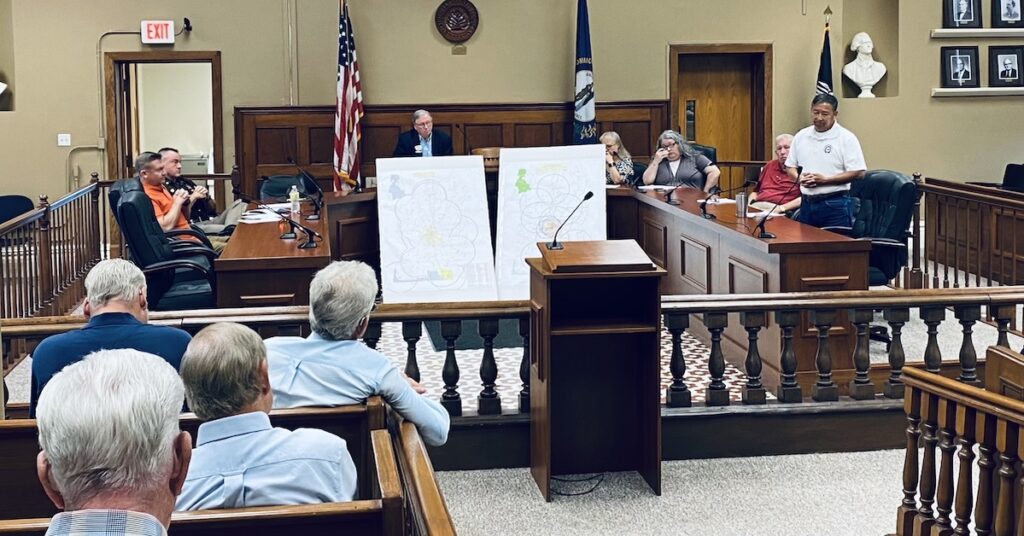
Several people spoke about challenges for voters who are elderly or don’t have a car to drive to a polling place.
Jennifer Nichols, who works in the clerk’s office, recalled that the local Republican and Democratic parties used to give rides to voters who didn’t have transportation.
“Why did y’all stop that?” she said. “Every time people call us, we have no phone number to give them to reach the Republican Party or the Democratic Party.”
Poll workers and voting machines
At a special fiscal court meeting immediately after the election board meeting, magistrates voted to increase election day pay from $200 to $300 for poll workers and from $125 to $300 for the Republican and Democratic representatives on the election board. Magistrate Jerry Gilliam, who is the Republican nominee for judge-executive, voted against increasing pay for the two election board members.
During the election board meeting, several people addressed the challenges of finding poll workers.
Those who do serve, aren’t necessarily signing up for the pay, said David Carroll, who works for Community and Development Services and has been a poll worker for several years. (Carroll prepared several maps for the election board showing proposed voting center sites and the distances between them.)
“They look at it as a civic duty to provide a day of their time to go and work when nobody else wants to work,” said Carroll. “They spend anywhere from 5 o’clock in the morning to 7 or 8 o’clock at night working.”
Polls are open from 6 a.m. to 6 p.m.
Because schools are closed on election day, Kem said he hopes more teachers will be interested in working polls with the court’s decision to increase the pay. He said he will be attending a meeting of teachers to pitch poll working.
In another matter, the fiscal court tabled a decision on buying more voting machines. They will wait to hear what the election board decides next week about the number of polling places to open in November.
Communicating with voters
Kem said the election board will do a better job to make voters aware of polling locations in the next election. One option will be to send a postcard to every registered voter in the county.
“We did a very poor job,” Kem said of communications prior to the May primary.
Board member Newby said the number of voting centers can be increased and communication can be improved, but voters have a role also.
“At some point, the voters have to take responsibility,” he said.
Clerk’s office employees
Several people pointed to changes in the role of Deputy Clerk Melinda Humphries, who has been the county’s elections coordinator for more than 20 years, as a problem in the May primary. Humphries was a candidate for county clerk and won the Republican nomination. She will face Democratic nominee Walter Cummings, who is the county treasurer, in the general election. Kem is retiring.
Humphries, who favors the use of voting centers, said members of the public who want to criticize the clerk’s office ought to get involved and help. She asked for a show of hands for those who have volunteered to be a poll worker. Four or five people raised a hand.
“So before you go and you start making decisions on things that you have not even been a part of, how about learning, how about ask questions, how about educate yourself, how about help us educate the voters,” she said.
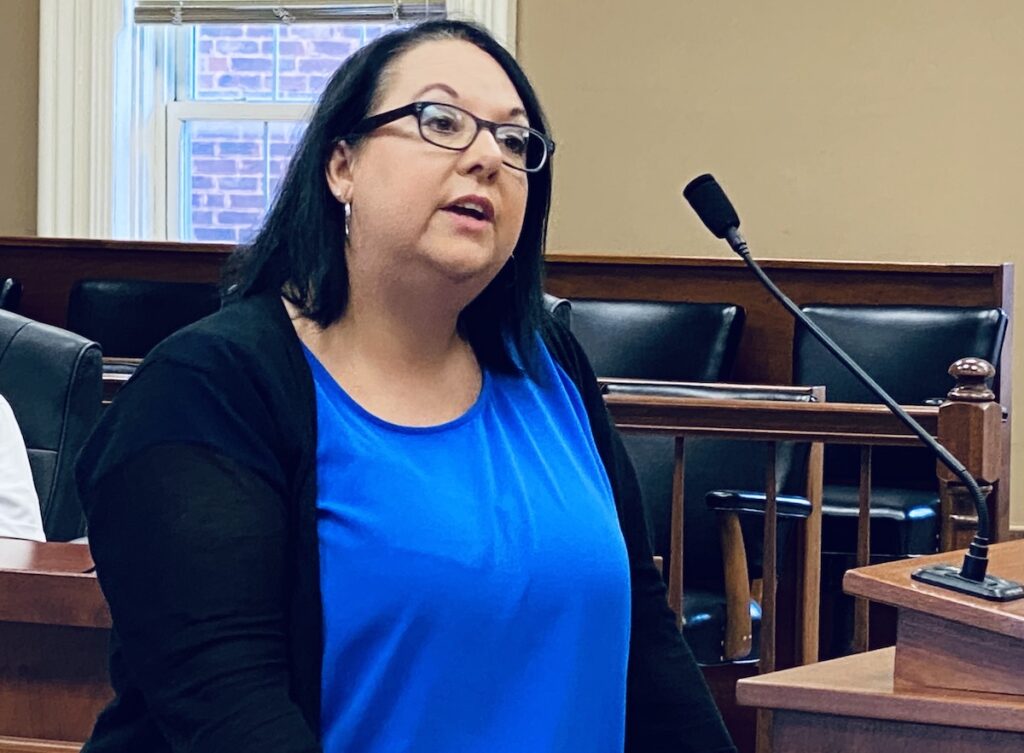
George Barnett, a candidate for District 3 magistrate, called for Humphries to be “reinstated” as elections coordinator. He said he was speaking for the Christian County Republican Party.
Humphries continued to handle some of her duties in the May primary, but she did not work directly with voting machines or ballots, and she did not act as the “public face” of the clerk’s office as she has in the past, according to Kem and others in the office.
County resident Brandon Garnett, who supports Cummings, said Kem was to blame for not having other employees trained in election work. Humphries was put in a “negative situation,” but a conflict of interest did exist that wasn’t fair to Cummings, he said.
“I don’t think in good faith, Mr. Barnett, you can come up here and say that somebody running for election should be handling elections for the community,” Garnett said.
Nichols, a deputy clerk who works on elections, said Garnett was insinuating she didn’t know how to do her job.
“It wasn’t just Mike’s decision to not have Melinda in the election office. It was Walter’s, too,” Nichols said. She said Cummings didn’t want Humphries to have an “upper hand” in the election.
“Melinda’s just doing her job,” Nichols said. “That’s what she’s hired to do. That’s it. It’s not like she’s out here politicking on county time. She’s not.”
Nichols said Kem was bullied into changing Humphries’ role.
“I don’t think she’s been taken out of elections,” Cummings said, addressing Nichols. He said his concern was that she shouldn’t be “the face of elections” and represent the clerk’s office at public events while seeking office.
“You didn’t even want her to say her name on the phone,” Nichols responded.
With an apparent argument developing between Nichols and Cummings, Kem said it was close to time for fiscal court to begin its meeting, and he adjourned the election board meeting.
The election board’s next meeting will be at 10 a.m. Thursday, Aug. 18, at the courthouse.


